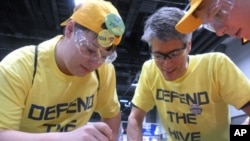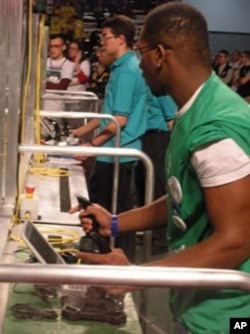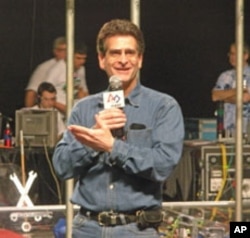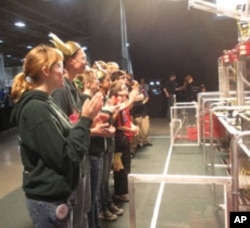Students from 59 U.S. high schools representing 11 states brought their robots to Washington recently to compete in the annual FIRST (For Inspiration and Recognition of Science and Technology) Robotics Competition.
The event challenged high school students, working with professional mentors, to design and build robots that could score a soccer goal.
Eighteen-year-old Alison Gale was back for her fourth year of competition. Nathan Hicks, 15, was there for the robots, while 18-year old Addonis Miller got inspired to join the competition after taking a class in technology.
They were among hundreds of U.S. high school students who came to Washington to compete in a Robotics Competition created by an organization called FIRST, which stands for, "For Inspiration and Recognition of Science and Technology."
'Varsity sport for the mind'
Each year, students across America work together in teams, with experienced mentors, on a particular technology project assigned to them by FIRST. They have only six weeks to complete the project before they set out for the competition.
The challenge this year was to design and build a robot that can kick a soccer ball into a goal.
The brains behind the competition is Dean Kamen, a leading American scientist and inventor who founded FIRST in 1989. His goal is to help young people discover the excitement and rewards of science and technology.
Kamen says he put FIRST together because he realized that, "the future of this country is going to depend more than ever on the technical expertise of our work force."
One in 10 US high schools participate
One of the reasons Kamen is so passionate about bringing technology to children he says, is to offer an alternative to their obsession with sports.
Sports, he says, crowds out the ability for kids - especially women and minorities - to realize that they're not going to make money bouncing and throwing a ball, "unless you're one of the four or five kids that turns out to be seven feet tall with extraordinarily good skills at bounce, bounce, bounce, throw."
But there are, he said, "millions of exciting jobs and careers for kids that develop the muscle hanging between their ears."
Support in high places
Sen. Harry Reid was one of two U.S. lawmakers who came to the competition. Reid, a senator from the state of Nevada, said he found it incredible that they weren't there watching kids play basketball, but watching kids, "who want to be scientists."
"There isn't anything we can do with our children that's more important than getting them interested in math and science," he said.
Many of the students said they felt these yearly competitions have taught them more than just building robots.
Nathan Hicks enjoyed working with people, "because you can share when you win, and when you lose you're not alone."
Addonis Miller believes he's learned leadership, courage and better technology skills.
Alison Gale said working on something for six weeks, and having an opportunity to come to the competition and show off what you've been doing has been, "the best time of high school so far."
And technology events like the Robotics Competition may be especially important for women, according to Judi Medwedoff, who is both mentor and chairperson of Alison's team.
"This year we have 12 girls on our team, out of the 58, and every year we have more and more women on the team and that's always something really great to see," said Medwedoff.
Dean Kamen hopes that once U.S. senators and members of Congress see what his organization is doing, they'll find a way to do their part in making sure FIRST is available to every school, to every kid in the country.







